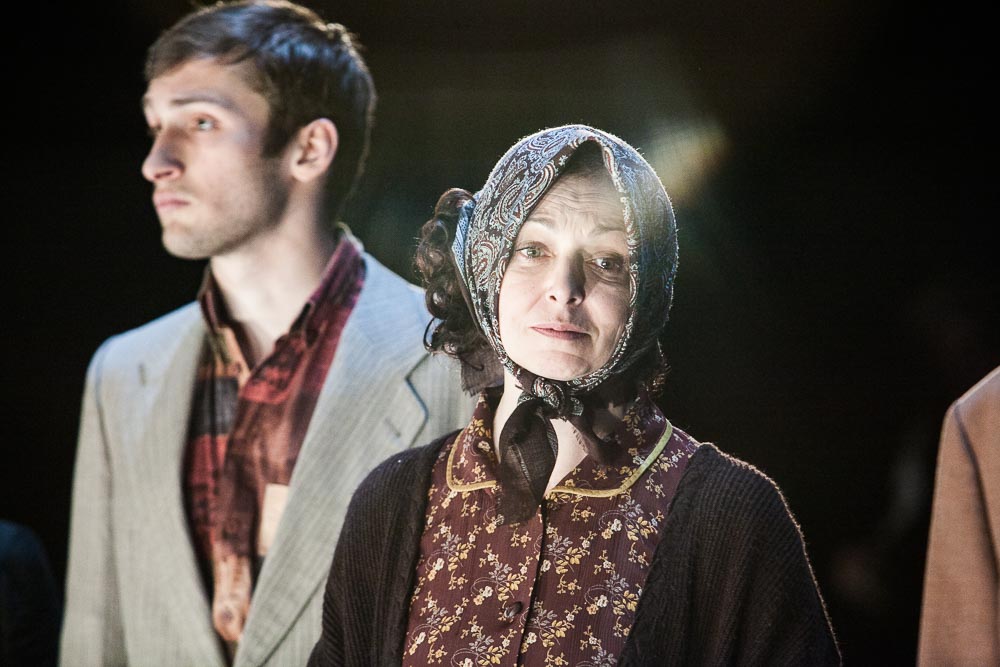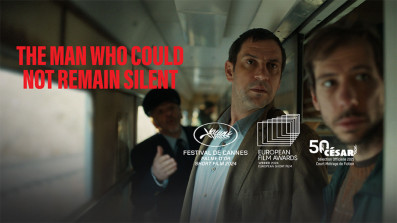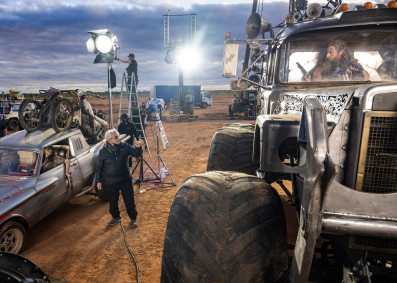
World Theatre Day With ZKM´s Black Mother Earth
Stay@Home with Theatre
When the author of this text had freshly moved to Zagreb, living in the B. neighbourhood, it took her a good amount of time and a precisely set timetable to catch bus number 268 in time to reach the very heart of the city. Buying the very first ticket to then ominously famed new play Black Mother Earth, she stood in the pitch dark at 18.00, a good two hours before, trembling but alas- the bus never came. The ticked shone in the scrapbook with its bold letters in white. Instead, one month and unexpected yet beautiful acquaintance later-she was ushered into the audience (“There are only a couple of seats on the stairs, is that ok?” “ I will stand if I must, no worries!”), feeling the ease one can only experience when meeting something well-known and beloved. And now, almost three years later, on this day when we celebrate the profound transformative beauty that we call Theatre, almost as if we were saying a blessing, Black Mother Earth remains one of the most compelling pieces to plant the seed of life on the ZKM´s stage.
The Past, The Present, The Sin
“What were their names? Because my friend´s name was Maja. Maja fucking Damjanic!”- hollers Mia Melcher as Dina, the long-term girlfriend of Matija (Adrian Pezdirc) on a Christmas morning, tired by his evasive nature whenever it comes to his childhood. She knows he moved from a small village to Zagreb when he was five or six, but his silence around the origin of those happenings is mortifying. Were it not for the opening and two doctors played by Pjer Menincanin and Milica Manojlovic, explaining their socio-psychological work, we would not have been an advantage over Dina. Because from the first moments of the play, we know that there was a series of inexplicable suicides in a small village on Mura river, several by hanging, one committed by cutting the veins and one by drowning. Most of those were grown men and women but the youngest was a boy of six, Franjo Klanc. No traceable link existed by means of evidence but the local community meant there was a boy who had been seen in the proximity of victims, just hours before they took their lives. His initials were M.D., his father had been the first victim of the streak and he had already moved to the capital.
Black Mother Earth presents a dramatization of Kristian Novak’s novel, under the capital directorial execution of Dora Ruzdjak Podolski following the dramatization authored by Tomislav Zajec. The atmospheric richness is brought through a compelling texture. Hanging in the vastness of the stage, metamorphosed by mimetic and non-mimetic sounds, a pure explosion of actor’s game with a language distinctly marking the original languages of the said village, Earth possesses a macabre yet unequalled beauty, somewhere where darkness and myth meet in the mind of a sorrow. Because, if anything, this opens on guilt, the question of forgiving and the sins. With white lights pouring over the flow of over two hours, we meet the tight-knitted community on a funeral of a well-respected family man, distinguished only by the love of his family and neighbours. He leaves behind his wife, daughter and son who is especially burdened by the fact he did not make up with his father and thus believes it is his small, six-years-old anger that murdered his father.
Angels, Darkness, Earth
The play’s intimacy is tearing apart perhaps, inside us, whatever remains of those memories we had as a child. Through Matija´s world, and from Pezdirc’s play the mutability between adulthood and child is adding the beat of the time that textures the entirety of the play, we are met with an important note of the text. The awareness of a child breaking in guilt over what he believes he had done, what he could have done to prevent it, and the defence mechanisms ridden by demons. Throughout the play, Matija has ripped apart by trying to take control of his imagination that serves his escapism as a curse and a blessing, at one point becoming almost a compulsion with the voices in his head. And, though there is space around enough, there seems to be no way out.
Nothing is more painful than a child in its repeated nightmare and, befriending the darkness around, Matija and his only friend Franjo (Dado Cosic in what is probably one of the most beautifully crafted roles) form a metaphorical bond where reality is for a moment still and gorgeous, consoling as the starlight sky. But it is soon to show that their age is defenceless and their boundaries thin, with Franjo’s ordeal of fire. Indeed, it is this character that shows the brilliance of the play’s duality. He is as playful despite his parents´ alcoholism and the teasing from his fellows, he is gulping Cedevita innocently as the only guest on Matija’s birthday, and he is as taciturn as the deep dark waters, where Matija goes to find his father, about the torture he is living through after each soccer’s practice.
To seek, to find, to repent and to apologise-for what we are, who we once were and what we are still afraid of in the hours of the night. Black Mother Earth speaks to what survives in us, and that is only, evermore, our past. Melcher´s belting, a teary song at the end comes as the ultimate forgiveness. For what could be more frightening than the story of our selves before someone we die to keep, and might lose, soon after the story has been told and the lights go out?
Find the play today on 24sata portal from 12.00 or on ZKM´s Vimeo Account















